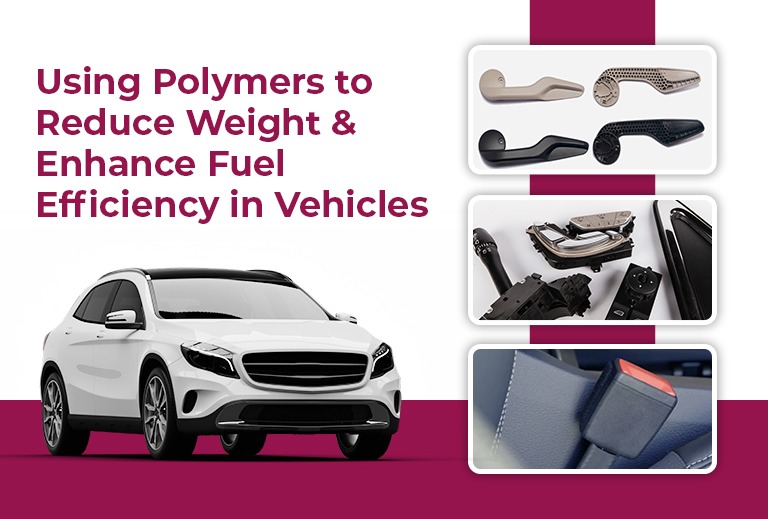Using Polymers to Reduce Weight & Enhance Fuel Efficiency in Vehicles
With the world focusing on sustainability and environmental conservation, the automotive industry is constantly looking for ways to reduce weight and improve fuel efficiency in vehicles. One promising solution is the use of polymers, which are lightweight and versatile materials that offer several benefits for vehicles.
Polymers can be engineered to exhibit specific properties, such as high strength, durability, and flexibility, making them ideal for numerous applications in the automotive industry. By replacing traditional materials with polymers, vehicle manufacturers can achieve significant weight reduction, resulting in improved fuel efficiency and reduced carbon emissions.
Let’s look at some of the advantages offered by polymers over other materials:
- Low weight that ensures reduced fuel consumption
Polymers weigh much less than metals, which are commonly used in the construction of vehicles. Replacing metal components such as bumpers and body panels with polymer counterparts can result in significant weight savings. A 10% reduction in vehicle weight can result in a 6-8% increase in fuel efficiency. This is because lighter vehicles require less energy to accelerate and maintain speed, resulting in reduced fuel consumption and greenhouse gas emissions.
- Excellent design flexibility for improved stability and handling
Polymers can be molded into complex shapes, allowing for greater freedom in design and aerodynamics. For example, polymer composites can be used to manufacture lightweight body panels with intricate geometries. This can help reduce drag and improve aerodynamic performance. This, in turn, can lead to reduced fuel consumption at higher speeds, as well as improved stability and handling.
- Excellent corrosion resistance for vehicle longevity
Unlike metals, which can rust and degrade over time, polymers are highly resistant to corrosion, ensuring the longevity and durability of vehicle components. This can result in reduced maintenance costs and extended service life, further contributing to the overall sustainability of the vehicle.
- Recyclable and environment-friendly
Polymers also have the advantage of being recyclable, which is crucial in promoting a circular economy and reducing the environmental impact of vehicles. Many polymers used in automotive applications can be recycled and used to manufacture new parts or other products, reducing the need for virgin materials and minimizing waste.
- Requires less energy to manufacture
The production of polymers typically requires less energy compared to metals, further reducing the overall environmental footprint of the vehicle manufacturing process.
Discover how polymers can revolutionize the automotive industry by visiting PLASTIVISION 2023, a premier event bringing together thousands of experts from the global plastic industry. It will be held from December 7-11, 2023 at the Bombay Exhibition Center, Mumbai. Learn more about this prestigious event and join us by visiting our website, calling us at +91 99303 55494, or sending an email to sanjeevani@plastivision.org. We look forward to hearing from you soon.
Leave a Reply Cancel reply
Recent Posts
- Understanding The Materials That Are Used To Build Plastic Toys
- All You Need To Know About Food-grade Plastics
- A Glance At The Materials That Boost The Performance Of Plastics
- Understanding The Importance Of Exploring New Business Opportunities In The Plastic Industry
- Understanding The Importance Of Investing in R&D For The Plastic Industry
Categories
- 3D Printing
- AIPMA
- Automation
- Automobile Sector
- Bio Plastics
- Environment
- Innovations In Recycling
- Latest Innovations
- Molds & Dies
- News
- Packaging Industry
- Plastic
- Plastic Application
- Plastic Industry
- Plastic Market
- Plastic Myths
- Plastic News From The World
- Plastic Packaging
- Plastic Products
- Plastic Recycling
- Plastic Solar Cells
- Plastic Toys
- Plastic Waste
- Plastic World
- Plastics
- Plastics And Their Applications
- Plastics In Agriculture
- Plastics In Healthcare
- Plastics In Medical Industry
- Plasticulture
- Processing Machinery
- Recycling Machines
- Robotics
- Uncategorized
- Virtual Reality
Archives
- November 2023 (3)
- October 2023 (2)
- September 2023 (3)
- August 2023 (3)
- July 2023 (3)
- June 2023 (3)
- May 2023 (2)
- April 2023 (2)
- March 2023 (2)
- February 2023 (2)
- January 2023 (2)
- December 2022 (3)
- November 2022 (1)
- October 2022 (1)
- September 2022 (2)
- August 2022 (1)
- July 2022 (3)
- May 2022 (3)
- March 2022 (2)
- February 2022 (1)
- January 2022 (1)
- September 2021 (2)
- August 2021 (3)
- July 2021 (4)
- June 2021 (4)
- May 2021 (3)
- April 2021 (2)
- March 2021 (4)
- November 2019 (8)
- October 2019 (8)
- September 2019 (8)
- August 2019 (8)
- July 2019 (8)
- June 2019 (8)
- May 2019 (8)
- April 2019 (8)
- March 2019 (8)
- February 2019 (11)
- January 2019 (8)
- December 2018 (8)
- November 2018 (12)
- October 2018 (12)

